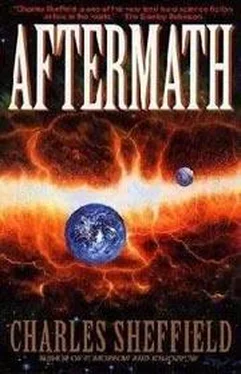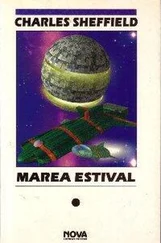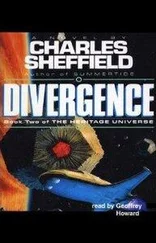“How much?”
The boy conferred with the girl, then asked, “How would you pay?”
“Dollar bills.”
“All right. Twenty dollars.”
Art exchanged looks with Dana — good news; currency was back in use again, at least in Washington — and said, “I bet there’s not more than a pound in that basket. Talk about robbery!”
The girl scowled at him. “It’s not. You’re lucky to get these. It’s supposed to be too early for strawberries, but most are already rotted. Take ’em or leave ’em.”
Art handed over the money and gave the basket of strawberries to Dana. He peered into the baby carriage as it went by.
“Now that’s interesting.”
“What is?” Dana was turning over the fruit, looking for the ripest. She handed one forward to Yasmin, gave another to Art, put one in her own mouth, and said indistinctly around it, “These haven’t been washed. They’re not very big, either. What’s interesting? They seemed like ordinary vegetables to me.”
“They are. Radishes and lettuce and onions, early peas and beans. It’s what’s missing that’s interesting.”
“All right, Sherlock. I’ll take the bait. What’s missing?”
“No signs of the bigger-better-tastier-faster recoms. You’d expect the carriage to be full of gene-spliced forms. Not a one.”
“So?”
“So we and our science created superior specialized food plants, precisely tuned to a particular ecological niche. Then the niche disappeared. The older, more primitive forms survived.” Art accepted another unwashed strawberry and ate it cheerfully. “A man could become philosophical about that.”
“A man better not, unless he wants a woman to ignore him.” Dana sat up straighter and stared ahead. “ Now what’s going on?”
The Jeep had been on Maine Avenue, ready to follow the traffic north onto Fifteenth Street. There were signs of major clear-up efforts, but the streets still held scattered heaps of trash and rubble. Instead of steering a way around them, Yasmin made an unexpected right turn at a narrow ramp and rolled down below street level.
“Avoiding bottlenecks in the middle of town,” she shouted back to them. She sounded pleased with herself over the engine’s rattle. “We’ll go the rest of the way underground. Save half an hour.”
Art thought again how tough she must be, under the sexy and decorative exterior. She had to be thinking about and grieving for her brother, but she held it under tight control. He was admiring Yasmin for that when Dana glanced at him in the sudden gloom and said, “An underground road system in Washington? That’s a new one on me.”
“Me, too. And I thought I knew the city pretty well. If it’s going to be like this all the way, I don’t think we’ll save much time.”
The Jeep had stopped at the bottom of the ramp. The automatic gate designed to accept an ID card was not working. It stood wide open, but a man in Army uniform stood by the gate. He took the pass that Yasmin held out and examined it closely before he waved them on. A couple of hundred yards farther along, the whole process was repeated.
“The Pentagon?” Dana asked, after the third halt and inspection.
“But then we’d have to cross the river. Maybe Capitol Hill?”
Yasmin must have heard their questions, but she pointedly did not answer them. All she said was, “It’s a lot quicker when the automatic ID checks are working.”
She made a final left turn and the Jeep emerged into a vast parking garage. The floor was blacktop, the whitewashed ceiling lit by fluorescent bulbs and no more than seven feet high. Yasmin drove all the way to the far end. The spaces there were tiny, designed for electric urban runabouts. Each had a sign: RESERVED, SPECIAL STAFF. PARK IN DESIGNATED SPOTS ONLY. AS A COURTESY TO THE NEXT USER, MAKE SURE THAT YOUR VEHICLE IS PLUGGED IN FOR RECHARGE. DO NOT OCCUPY MORE THAN ONE SPACE.
Yasmin parked the Jeep neatly, but it was so wide it sprawled across two spaces. She shrugged. “So they’ll probably sue me. Come on.”
They climbed down. Art took three steps and paused, puzzled. After a moment he realized what the problem was. It was like the gene-spliced fruit and vegetables, something noticeable by its absence. His right knee was guaranteed to stiffen up after hours in one position. This morning he felt not a twinge. It must be the telomod treatment, it could be nothing else. The urgency hit him again. He and Dana needed to get out of here and learn what was happening with Seth and Oliver Guest. Without the genome scanners, everything going on inside their cells was guesswork.
He hurried after Yasmin and Dana, in through yet another checkpoint complete with armed guard. Then it was an elevator, rising steadily for four floors. And, at last, they were inside a structure designed for people rather than vehicles.
Yasmin picked up a telcom by the elevator door, made a connection, and said, “Yasmin. I’m back.”
Art sensed an odd tension in her voice, but she went on, “How’s his schedule? Yes, ten minutes should be enough.”
She led them along a short corridor, saying good morning to the handful of people they passed. Clearly, she was a regular. And clearly, this was the house of someone very rich. Everything — pictures, carpets, drapes — was either an antique or a superb fake.
At the end of the corridor Yasmin paused. “I hope this goes all right, but it may not. A couple of days ago I had a horrible screaming fight with the man inside this room. We said some pretty awful things to each other. I want to patch things up, but if I can’t, please remember that it’s nothing to do with you.”
They entered a smallish room, whose only occupant sat at a cluttered desk before a thick-paneled door of dark wood. He stood up as they came in, an unusually handsome young man whose face was a picture of uncertainty. He and Yasmin stared at each other for a few seconds.
“Want to go on working here?” she said at last.
He grimaced. “Is that what he said to you? It’s exactly what he said to me.”
“Me, too. What did you tell him?”
“I said, yes, I want to work here. More than anything I can think of.”
Yasmin nodded. “That’s pretty much what I said, too. He made me feel about two inches tall.”
“I know. The worst thing is, he was absolutely right. Can we have lunch today?”
“I’d like that. We’ll compare wounds.” Yasmin turned to Art and Dana. “This is Auden Travis. Auden, this is Art Ferrand and Dana Berlitz. They were at the syncope facility, too.”
Travis nodded, but he hardly glanced at the two visitors. He was looking appalled at Yasmin. “I heard,” he said. “I should have mentioned it before, instead of talking about our jobs. I’m really sorry about Raymond. It must have been awful.”
“It was. Worse than I thought. But it’s over.” Yasmin swallowed and looked toward the paneled door. “Anyone with him?”
“Not at the moment. They found another big store of RAM chips, way underground at Cheyenne Mountain. Giga capacity, not tera, so they’re all pretty much out-of-date. But we had a few million flown in yesterday. A technician slapped a bunch of them together in parallel, and was in here earlier trying to get the holo projection unit up and running. He left about fifteen minutes ago. He said he’d be back soon. So it’s a good time.” He glanced back to Art and Dana. “They were checked?”
“Back at Indian Head. All we could with the deep scanners out of action. They’re clean.”
That meant little to Art, but Auden Travis nodded and said, “It’s what we have to settle for at the moment. Go ahead.”
Yasmin moved to the door, knocked, and opened it. She ushered Art and Dana in ahead of her.
Читать дальше












